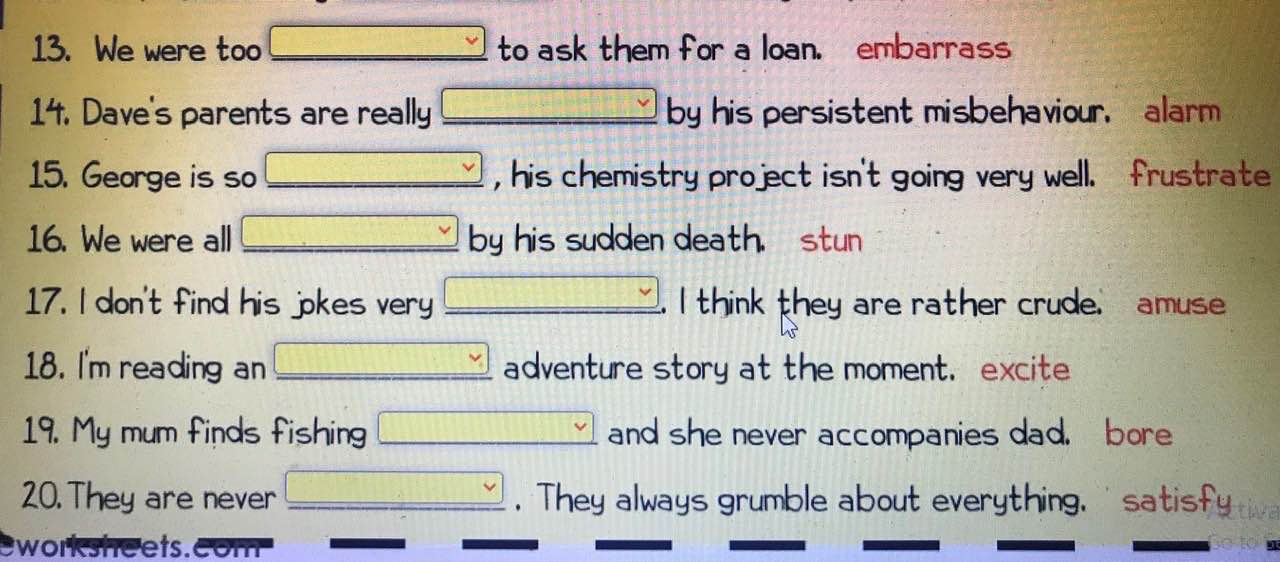satisfying
bored
frustrating
stunning
alarming
excited
interested
tiring
amused
pleasing
surprised
anoying
satisfying
bored
frustrating
stunning
alarming
excited
interested
tiring
amused
pleasing
surprised
anoying
Chọn dạng -ed hoặc -ing cho động từ
Bài 4: Sử dụng tính từ đuôi “ed” hoặc “-ing” tạo thành từ những động từ trong ngoặc để hoàn thành những câu dưới đây.
1. The kitchen was in a_______________ state when she left. ( disgust)
2. Jim had an accident yesterday and his situation is _______________. (worry)
3. The result of her exam is very _______________. ( disappoint)
4. This is the most_______________ film I have known. (thrill)
5. Everyone was _______________ at her new hair. (surprise)
6. I really got _______________ at the lack of progress. (frustrate)
7. What is the most _______________ creature in the world? (frighten)
8. It is absolutely a visually _______________ movie. (stun)
9. Jane gave up her part-time job because it was too _______________(exhaust)
10. The rainforests are disappearing at an _______________ rate. (alarm)
11. They are never_______________. They are always complaining. (satisfy)
12. My teacher was very _______________that I studied hard. (please)
13. I am _______________ to know your thought of the movie. (intrigue)
14. Your remarks are_______________. You should apologize. (insult)
15. I was deeply _______________ by the news. (disturb)
16. It was _______________ outside. You should put on thick coat before going out. (freeze)
17. My parents always give me a warm_______________ hug whenever I get home. (welcome)
18. Students easily get _______________. (distract)
19. I find his argument very _______________. (convince)
20. Jane appeared _______________ and confident before the interview. ( relax)
Các bạn giải dùm mình từ câu 5 với ạ:
Fill in the blank with the correct forms [-ING or -ED] of the verb.
5-By ____ (use) active learning strategies, teachers can create a more engaging learning environment.
6-Students who are actively ____ (engage) in their learning process will have better academic performance.
7-By ____ (encourage) students to participate in class discussions, teachers can help themimprovetheir communication skills.
8-Kids who are actively ____ (involve) in their learning process are more likely to enjoy the experience.
9-By ____ (incorporate) active learning strategies into their lessons, teachers can make learningmore interactive and dynamic.
10-Students who are actively ____ (participate) in group projects can develop important social skills.
11-By ____ (encourage) students to ask questions, teachers can help them develop critical thinkingskills.
12-Kids who are actively ____ (explore) new topics and ideas are more likely to develop a lifelonglove of learning.
13-By ____ (offer) opportunities for students to practice and apply what they have learned, teacherscan help them develop important problem-solving skills.
14-Active learning can help students ___ (become) more confident in their abilities to learn andsucceed.
15-Active learning can help students ____ (develop) a sense of ownership over their education.
16-By ____ (model) active learning behaviors and strategies, teachers can help students learn howto learn.
17-Active learning can help students in ____ (build) resilience and adaptability, as they learn tonavigate new challenges and situations.
18-The students were _____ (excite) about their field trip to the zoo.
19-The teacher is _____ (surprise) the students with a pop quiz on Friday. 20-The students are _____ (interest) in learning about science and technology.
Chọn từ (ứng với A, B, C hoặc D) có phần gạch chân được phát âm khác với những từ còn lại trong mỗi câu sau:
1. a) interfered b) allowed c) visited d) played
2. a) water b) swimming c) between d) rowing
3. a) caps b) meters c) swimmers d) lines
Chọn từ có trọng âm chính nhấn vào âm tiết có vị trí khác với những từ còn lại:
4. a) compare b) problem c) lesson d) moment
5. a) carefully b) comfortably c) especially d) possibly
Khi V-ing +ed + adj và N thì ra câu gì
Hãy cho ví dụ
Chúc may mắn :)))))))))))))))))))
2-Complete the sentences with adjectives. Form the adjective by adding -ing or -ed to the verb in parenthesis.
1-[to bore] I turned offthe television in the middle ofthe programme because it was ___
2-[to exhaust] Thejourney was __! Twelve hours by bus!
3-[to excite] My sister is so ___because she is going on holiday tomorrow. 4-[to relax] I am so __that I don't want to move.
5-[to interest]The programme was really ___
6-[to satisfy] She is never ____with her work.
7-[to tire] Cleaning is so ___! I think I'll have a rest.
8-[to shock] My grandmother was ___ by the man's bad language.
9-[to surprise] My exam results were great! It's really ___but good, ofcourse.
10-[to shock] The news was so ___ that she burst into tears.
Complete the following sentences, beginning with an -ing form used in the way shown in brackets.
1. (-ing clause giving the reason for an action)
Not.............before, I was a bit nervous.
2. (-ing clause describing a background situation for another action)
.................................I noticed how quiet it was.
3. (-ing clause giving more information about a verb, like an adverb)
I walked along the street,....................................................................
4. (-ing clause giving more information about a verb, like an adverb)
I went into the room, not......................................................................
Nhanh nha mọi người.Cảm ơn trước ạ
Bài 3: Put the verb into the present continuous. (I am –ing) or present perfect continuous (I have been –ing)
1. Maria has been learning (Maria/learn) English for two years.
2. Hello, Tom ..... (I/look) for you. Where have you been?
3. Why ..... (you/look) at me like that? Stop it!
4. Linda is a teacher ..... (she/teach) for ten years.
5. ...... (I/think) about what you said and I've decided to take your advice.
6. 'Is Paul on holiday this week?' 'No, ..... '(he/work?)
7. Sarah is very tired ..... (she/work) very hard recently.